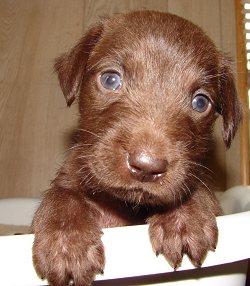Height: 22-27 inches
Weight: 45-70 lbs.
Life Span: 10-14 yrs.
Breed Group (Standard): Companion Dogs
Breed Group (Miniature and toy): Companion Dogs
Overview
Well-bred poodles are among the brightest and most responsive breeds. There
are three sizes (standard, miniature, and toy). All sizes are playful, affectionate,
eager to please, and energetic. They enjoy working and get along well with
other animals.
Miniature and toy poodles may be more reserved with strangers and less tolerant
of children than standard poodles unless socialized with them at an early
age. They are also more prone to biting than standards.
Poodles shine in obedience classes, which should begin early, as should
socialization. They enjoy a good bark when someone comes to the door but
are not aggressive.
Poodles do well in cities as long as they get enough exercise and social
interaction. Beware of "teacup"-size poodles (which are tinier than toys);
they seem to have a lot of temperament and health problems.
Appearance
The coat is abundant and dense and can be curly or corded. Coat color is
solid gray, silver, apricot, black, white, blue-gray, brown, or cream.
Grooming & Exercise Needs
Poodles do not shed but still need to be combed and brushed a few times
a week and clipped, scissored, and shaped every four to six weeks. Poodles
need several long, brisk walks and romps in a secured area daily. Standards
need more exercise than miniatures and toys.
Origins
The standard poodle originated in Germany during the Middle Ages and was
used as a water retriever. Even then the coat was clipped (as it is today)
to reduce water resistance and to enhance buoyancy. In 19th-century France
the standard poodle was used often as a water retriever and circus dog.
Miniature and toy poodles were developed in England in the 18th century
(during the reign of Queen Anne) and served as truffle hunters, performers,
and companions.
"Poodle" comes from the German pudelin, which means "to splash in
the water." Poodles of all sizes are sometimes erroneously referred to as
French poodles.
Special Alerts
It is especially important to obtain a poodle from a reputable breeder.
Breed-related health concerns for the standard poodle: hip dysplasia, eye
problems including progressive retinal atrophy, epilepsy, bloat, sebaceous
adenitis (a skin disease resulting in scabs, hair loss, and predisposition
to bacterial infections), kidney disease.
For miniature and toy poodles: atopy, eye problems, deafness, patellar luxation,
heart and blood disorders, epilepsy, Cushing's syndrome.
Reference: AKC - American Kennel Club |

